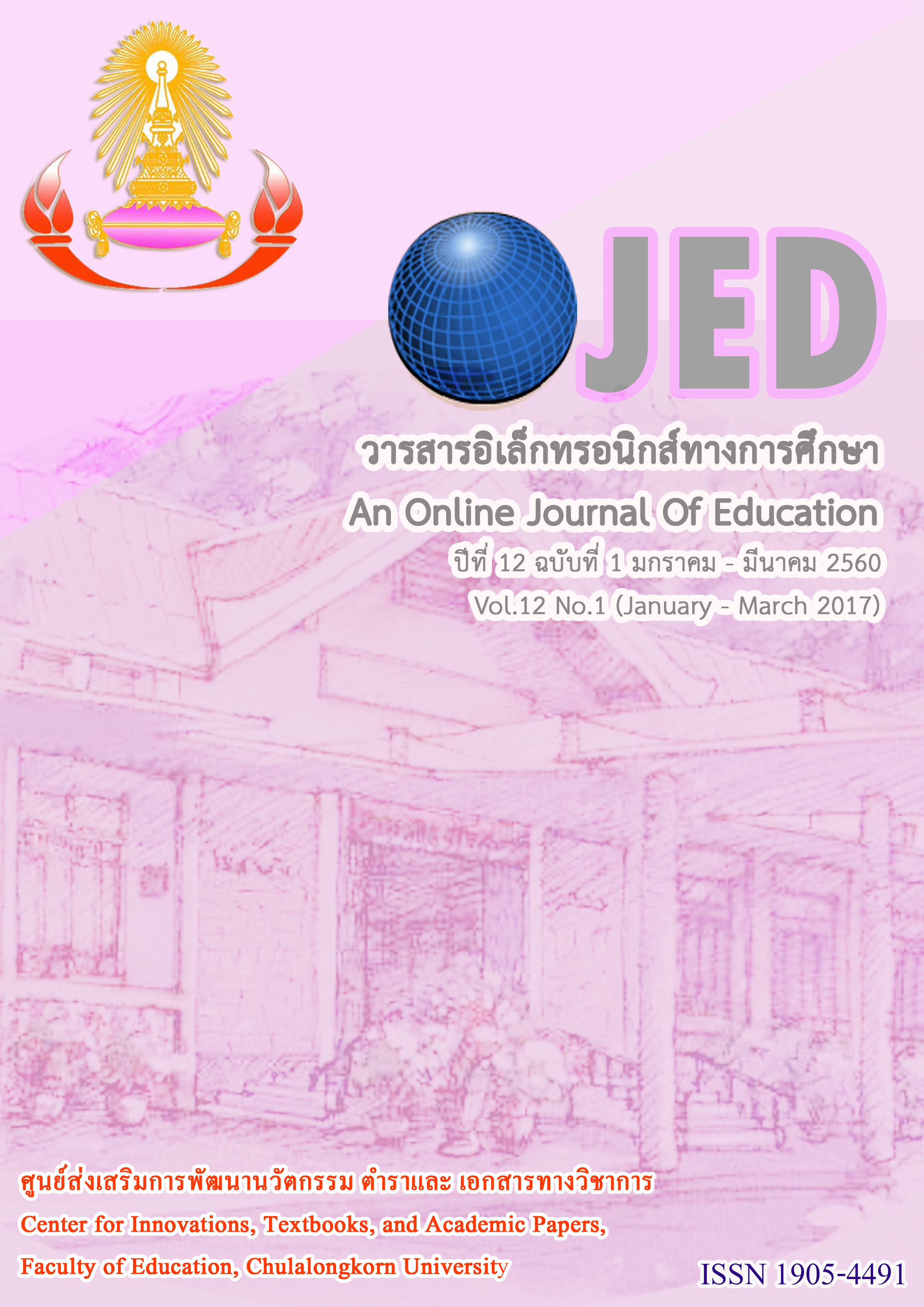ผลของการใช้แนวคิดการสร้างตัวแทนความคิดที่มีต่อความสามารถในการสร้างแบบจำลองและผลสัมฤทธิ์ทางการเรียนชีววิทยาของนักเรียนมัธยมศึกษาตอนปลาย
Keywords:
แนวคิดการสร้างตัวแทนความคิด, ความสามารถในการสร้างแบบจำลองทางวิทยาศาสตร์, ผลสัมฤทธิ์ทางการเรียนชีววิทยา, REPRESENTATION CONSTRUCTION APPROACH, SCIENTIFIC MODELING ABILITY, BIOLOGY LEARNING ACHIEVEMENTAbstract
การวิจัยครั้งนี้เป็นการวิจัยเชิงทดลองเบื้องต้น ที่มีวัตถุประสงค์ในการวิจัย คือ 1) เพื่อศึกษาความสามารถในการสร้างแบบจำลองทางวิทยาศาสตร์ของนักเรียนที่เรียนด้วยแนวคิดการสร้างตัวแทนความคิด และ 2) เพื่อศึกษาผลสัมฤทธิ์ทางการเรียนชีววิทยาหลังเรียนของนักเรียนที่เรียนด้วยแนวคิดการสร้างตัวแทนความคิด กลุ่มเป้าหมาย คือ นักเรียนชั้นมัธยมศึกษาปีที่ 6 ในโรงเรียนมัธยมศึกษาขนาดใหญ่พิเศษ กรุงเทพมหานคร ในภาคเรียนที่ 1 ปีการศึกษาที่ 2559 จำนวน 27 คน เครื่องมือที่ใช้ในการวิจัยครั้งนี้ ได้แก่ 1) แบบประเมินความสามารถในการสร้างแบบจำลองทางวิทยาศาสตร์ที่มีค่าดัชนีความสอดคล้องระหว่างผู้ประเมินเท่ากับ 0.89 2) แบบสอบผลสัมฤทธิ์ทางการเรียนชีววิทยาที่มีความเที่ยงเท่ากับ 0.87 ค่าความยากอยู่ในช่วง 0.25-0.80 และค่าอำนาจจำแนกอยู่ในช่วง 0.20-0.65 และ 3) แผนการจัดการเรียนรู้โดยใช้แนวคิดการสร้างตัวแทนความคิด และวิเคราะห์ข้อมูลด้วยสถิติเชิงบรรยาย ได้แก่ ค่าเฉลี่ยเลขคณิต ค่าเฉลี่ยร้อยละ และส่วนเบี่ยงเบนมาตรฐาน
ผลการวิจัยสรุปได้ดังนี้ 1) นักเรียนที่เรียนด้วยแนวคิดการสร้างตัวแทนความคิดมีความสามารถในการสร้างแบบจำลองทางวิทยาศาสตร์อยู่ในระดับดี คือ ร้อยละ 80.18 ซึ่งสูงกว่าร้อยละ 70 ตามเกณฑ์ที่กำหนดไว้ และ 2) นักเรียนที่เรียนด้วยแนวคิดการสร้างตัวแทนความคิดมีผลสัมฤทธิ์ทางการเรียนชีววิทยาอยู่ในระดับดี คือ ร้อยละ 70.49 ซึ่งต่ำกว่าร้อยละ 80 ตามเกณฑ์ที่กำหนดไว้
This study was a pre-experimental research. The purposes of this study were to 1) study the scientific modeling ability of upper secondary school students who learned through the representation construction approach, and 2) study the biology learning achievement of upper secondary school students who learned through the representation construction approach. The target group was 27 grade 12 students of an extra-large sized school in Bangkok who studied in the first semester of academic year 2016. The research instruments were 1) a scientific modeling ability evaluation form with a rater agreement index at 0.89, 2) a biology learning achievement test with reliability at 0.87 and level of difficulty between 0.25-0.80 with a level of discrimination between 0.20-0.65, and 3) representation construction approach lesson plans. The collected data was analyzed by arithmetic mean, mean of percentage and standard deviation.
The research findings were as follows: 1) the scientific modeling ability of the students who learned through the representation construction approach was rated at a good level at the percentage of 80.18 with was higher than the criterion set at percentage of 70, and 2) the biology learning achievement of the students who learned through the representation construction approach was rated at a good level at percentage of 70.49 which was lower than the criterion set at a percentage of 80.




